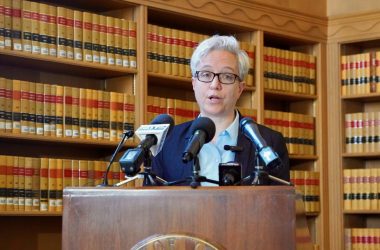The Oregon Department of Human Services has agreed to pay $40 million to settle a lawsuit filed by four former foster children who were sexually and physically abused in a foster home, court records show.
The agency’s settlement offer marks the culmination of a five-year court battle that scrutinized the harsh treatment of children in Oregon’s foster care system and exposed the agency’s efforts to cover up the abuse of the children in a Marion County foster home in Keizer. In a court filing submitted on Wednesday in U.S. District Court in Eugene, the children’s attorneys said their clients have accepted the state’s offer of $40 million – the largest in an Oregon state foster care lawsuit.
One of the victims in the case endured sexual abuse that led to a 30-year prison sentence for a former foster father in 2017. With detailed documents and testimony, the lawsuit alleges caseworkers repeatedly ignored signs of abuse and tried to cover up the abuse of one child who suffered seven broken bones – even as a criminal prosecution was underway.
Portland attorneys Steven Rizzo and Mary Skjelset said in a statement they and their clients want to see the system change.
“For years, our clients – small children – suffered in the custody of Oregon’s Department of Human Services: They suffered severe abuse whose grim hallmarks – emotional distress, suspicious injuries and reports of concern – arose from a home dangerously unqualified to provide safe foster care,” they said in a statement to the Capital Chronicle. “In telling their stories, our clients wanted most to prevent this tragedy from repeating and thereby improve the lives of other foster children. No amount of money can fully account for what these children and their families endured. We hope that the magnitude of this settlement will motivate meaningful reform and evoke the public attention that DHS, and those entrusted to it, so deeply need.”
Jake Sunderland, a spokesperson for the Oregon Department of Human Services, declined to comment on the case.
History of abuse
The case stems to 2011, when the Oregon Department of Human Services certified Melissa and Casey Miller, a couple in Keizer, to be foster parents in their 900-square-foot home. The 80-page lawsuit lays bare a repeated pattern of agency workers seeing signs of abuse, injuries and emotional trauma and not taking action to remove the children from the home.
The first two children arrived at the house in December. The younger one, 2, started to show signs of abuse within the first month, including bruises and marks on his face, ears, neck, ribs, and legs, the lawsuit said. But the agency disregarded numerous reports and concerns about the child, including calls to the child abuse hotline, the lawsuit said.
The older child, a 5-year-old girl, also showed signs of sexual abuse, which were ignored, the lawsuit said. Instead, the agency worked with the Millers to curtail visits with her biological mother, the lawsuit said.
In 2013, a 3-year-old foster child was placed in the home, who also soon showed anxiety and signs of physical injuries and distress. And during one agency visit to their home, an agency caseworker saw a lack of cleanliness and safety hazards, including cobwebs, mold, peeling paint and dangling power cords.
DHS placed a fourth child in the home, a 10-month-old girl, who was treated at a hospital emergency room in 2013. She had seven fractures on her arms and legs.
In a police interview, Casey Miller told detectives he yanked the child’s arm and heard a “loud pop,” and in other instances “grabbed” the child’s wrist and legs roughly.
Police arrested Casey Miller for criminal mistreatment, a felony for the physical injuries and withholding medical attention. By then, DHS had already received complaints that he had roughly treated the toddler and it had overly relied upon Melissa Miller’s assurances that the children were merely acting out, the lawsuit said.
As Miller’s criminal case progressed, the agency contacted Oregon Health & Sciences University to get expert testimony about whether the child’s multiple fractures were from brittle bone disease. But unbeknownst to the OHSU experts, the agency withheld the police reports with Miller’s statements, the lawsuit said. After a prosecutor provided police reports, the OHSU experts confirmed that brittle bone disease was not the cause of the fractures.
He was sentenced to 36 months of probation.

In 2015, one of the other foster children – by then in an another home – disclosed sexual abuse from Casey Miller. Another foster child disclosed sexual abuse in 2017, the lawsuit said.
In that case, Casey Miller forced the young girl to watch pornography and sexually abused her repeatedly, the lawsuit and criminal court documents show. Whenever Miller was done abusing her, he offered her chewing gum or pocket change from his job at a gas station, the lawsuit said.
In 2017, Casey Miller was sentenced to 30 years of prison for the sexual abuse. Melissa Miller was not charged.
Attorneys faced agency pushback
The court filing shows how Portland attorneys Steven Rizzo and Mary Skjelset spent years navigating roadblocks from the state agency, fighting for records and assembling the historic case.
In 2017, the two started to investigate on behalf of one child who suffered sexual abuse in an agency-certified foster home in Marion County.
As their investigation progressed, they found two more children who were victims. That same year, the attorneys submitted signed releases on behalf of the children to access their child welfare records from the agency.
“The agency pushed back,” Rizzo wrote in the filing. “Notwithstanding the releases, DHS resisted producing the requested records.”
The agency claimed the children would have to pay $10,000 to access their records and cover a $175-an-hour fee so agency attorneys could review and black out their records, the filing says.
“Weaponizing the law against children that it failed to protect, DHS caused unnecessary delay and expense,” the attorneys wrote.
After a year of investigating, the case was filed in 2018. The attorneys continued to get records from law enforcement agencies, the Marion County District Attorney’s Office and other sources. As they deposed witnesses, they found that the agency had never referred three of the children for a medical evaluation as required by the state law for signs of abuse.
In 2021, the attorneys and children still fought to get records, including communications between an attorney and two agency employees who had dismissed one child’s allegations outright, the filing said.
In June, the settlement talks started, with the final offer of $40 million extended in October. Without a settlement, the case was headed to trial next year. The plaintiffs were prepared and had 35 witnesses lined up to testify.
To reach that settlement, the attorneys obtained and reviewed more than 233,000 pages of agency records and other documents, including counseling, school and medical records from about 20 other organizations. They also obtained dozens of sworn statements.
The children, now approaching adulthood, will share the award after attorney fees and court costs. Court documents don’t disclose the breakdown of the award among the children. Their attorneys are asking the judge to keep the breakdown confidential to protect the privacy of the plaintiffs.
Oregon Capital Chronicle is part of States Newsroom, a network of news bureaus supported by grants and a coalition of donors as a 501c(3) public charity. Oregon Capital Chronicle maintains editorial independence. Contact [email protected]. Follow Oregon Capital Chronicle on Facebook and Twitter.
News tip? Send your information to [email protected].
HOW TO SUBSCRIBE – The Malheur Enterprise delivers quality local journalism – fair and accurate. You can read it any hour, any day with a digital subscription. Read it on your phone, your Tablet, your home computer. Click subscribe – $7.50 a month.




